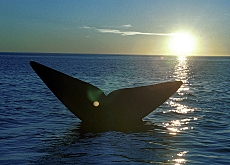
Swiss advocate compromise over whaling

Switzerland has repeated its calls for controlled but limited whaling at a lively International Whaling Commission (IWC) conference in Tokyo.
Japan threatened to quit the IWC unless it was reformed and pro-whaling nations accused anti-whaling nations of “imperialism” for imposing a ban on commercial hunts.
“The major goal was to find a way out of the situation we have been in for years, namely a total lack of progress – not even the possibility to communicate,” Bruno Mainini, from the Federal Veterinary Office, told swissinfo.
“I got the feeling that the willingness to discuss in an open and more friendly and reasonable way than in the past was very clear.”
This newfound bonhomie did not extend to everyone. A draft summary of the conference, which was to be debated and revised before the IWC’s next official meeting in Anchorage in May, accused anti-whaling countries of discriminating against and slandering pro-hunt members.
The three-day meeting, which Japanese officials had termed a final attempt to save the IWC, was marred by a boycott by 26 anti-whaling nations – included the United States, Australia and Britain. This prompted criticism that these countries had chosen confrontation over dialogue and the need to restore trust.
“Unacceptable”
Switzerland’s stance in the debate could be described as “pro-whaling with controls”.
“We are not saying we should lift the moratorium and allow commercial whaling immediately,” Mainini said. “We think it would be better to have a small number of whales killed according to clear criteria – under a quota or a control mechanism – than having uncontrolled whaling as we have now.”
Switzerland is not happy about the current situation. Over the past ten years the number of whales killed by IWC members has tripled, something officials say must be stopped.
“If you measure success by the number of whales killed, then we failed,” added Mainini.
But he pointed out that Switzerland does not have a problem in principle with killing whales.
“Switzerland believes in the principles of sustainable use of natural resources, so for that we can’t be totally against whaling. But we think it should be limited to a few species and the number should be as low as possible,” he said.
Hurdles
Many delegates in Tokyo warned the IWC was at a turning point and could even be headed for collapse if nothing changes.
“No new ideas have come from this meeting,” environmental group Greenpeace said on Thursday. “The onus now clearly rests on the governments from other countries to seize the initiative and make the IWC a body that works for the whales and not for the whalers.”
Mainini says he is cautiously optimistic for the future while recognising considerable challenges.
“The biggest hurdles are represented by the past,” he said. “After so many years of bad dialogue, non-dialogue or mistrust, you first have to find a level where you don’t have to fear that whatever you say will be misused.”
But he admitted: “If there’s no real change in the near future – I’m talking about two or three years – I can’t see how this organisation can be saved. However we always have to remain optimistic because it would be too sad [if we failed].”
swissinfo, Thomas Stephens
The IWC instituted a moratorium on commercial whaling in 1986. But the group is now bitterly divided between countries that assert all whales need protection and others, such as Japan, that say some species are now abundant enough for limited hunting.
Japan, which also says whaling is a cultural tradition, began scientific research whaling in 1987. The meat, which under commission rules must be sold for consumption, ends up in supermarkets and restaurants, but the Japanese appetite for whale meat is fading.
Iceland is also permitted to catch whales for scientific reasons. In addition, it resumed commercial whaling in 2006.
Norway has a legal objection to the moratorium and has continued commercial hunting of minke whales.
The International Whaling Commission was set up by the International Convention for the Regulation of Whaling on December 2, 1946 to promote and maintain whale fishery stocks.
Since the 1980s the IWC has become the primary mechanism for the protection of all species of whale.
In 1986 it adopted a moratorium on commercial whaling, which is still in force.
The IWC’s 59th annual meeting will take place in Anchorage, Alaska, from May 7-18.

In compliance with the JTI standards
More: SWI swissinfo.ch certified by the Journalism Trust Initiative




























You can find an overview of ongoing debates with our journalists here . Please join us!
If you want to start a conversation about a topic raised in this article or want to report factual errors, email us at english@swissinfo.ch.